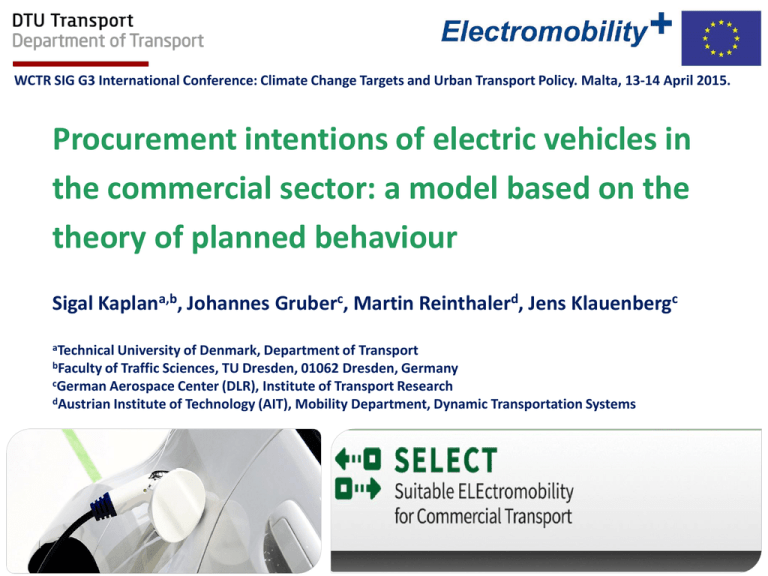Document 13318315
advertisement

WCTR SIG G3 International Conference: Climate Change Targets and Urban Transport Policy. Malta, 13-14 April 2015. Procurement intentions of electric vehicles in the commercial sector: a model based on the theory of planned behaviour Sigal Kaplana,b, Johannes Gruberc, Martin Reinthalerd, Jens Klauenbergc aTechnical University of Denmark, Department of Transport Traffic Sciences, TU Dresden, 01062 Dresden, Germany cGerman Aerospace Center (DLR), Institute of Transport Research dAustrian Institute of Technology (AIT), Mobility Department, Dynamic Transportation Systems bFaculty of Introduction • Vehicles can be a problem in the city because of (Feng and Figliozzi, 2012): • The high share of sales of light vehicles • The fast-growing share of commercial vehicles • The high travel expenses compared to the use of the household • The pollutant emissions: sulfur oxides, particulate matter, and nitrogen • Commercial vehicle fleets for small and medium-sized enterprises are considered good candidates for early adoption of ECVs due (Nesbitt and Sperling, 2001): • Their autocratic rule options • High openness to innovative changes, risk provisions and government encouragement Introduction • Previous research focused on the factors underlying the market penetration of EVs in households. • Only a few recent studies focused on firms: • Aggregated analysis to understand the proportion of market penetration at the national level as a function of financial incentives, infrastructure and production facilities (Sierzchula et al., 2014) • Analysis of the usage patterns of 174 electric cars, and the driving experience in terms of user satisfaction and confidence (Wikström et al., (2014) • A qualitative study of 14 firms to understand the effect of the willingness to test of new technologies, national funding and improving the public image of the firm as motivators for the purchase of ECVs(Sierzchula, 2014) Research objectives To propose a behavioral framework for the procurement intentions of ECVs at the firm level To estimate a statistical model on a large data sample from firms to validate behavioral frame Behavioral framework • The model is based on the “Theory of Planned Behavior” (Ajzen, 1991): TPB Fleet manager characteristics Vehicle fleet use Positive attitudes about ECV use Knowledge about ECV Positive norms for ECV use Business sector Operational ease of ECV use Pprocurement intentions of ECVs Estimated model • The model was estimated using ”structural equation model” • Measurement equations: I rn Zln* r rn and n N 0, for r 1,..., R • The structural equations linking the latent attitudinal constructs to fleet manager and firm characteristics: Zln* FM ln l FI ln ln and n N 0, for l 1,..., L • The structural equations linking the latent attitudinal constructs to ECV procurement intentions: PI in Z ln* z in and n N 0, for i 1,..., I • The model is estimated using Maximum Likelihood with Huber-White covariance adjustment for calculating the standard deviation • Goodness-of-fit is calculated by comparative Fit Index (CFI), the standardized root mean residual (SRMR) and the Root Mean Square of Approximation (RMSEA) Data collection • Web-based tailor-made questionnaire in German and Danish • Questions related to: Company size and number of employees Industrial sector Fleet size and use pattern Purchase intentions of ECVs Personal attitude of fleet managers towards ECVs Interest of the fleet managers towards ECVs, Subjective norms among companies in the sector Incentives for the use of ECVs. Data collection • The survey was administered in Denmark, Germany and Austria during July to October 2014 to a representative sample of 65,000. • 1,443 complete responses, with a response rate ranging between 1.0-3.4%. • Firm location: Austria: 14.3% Denmark: 46.9% Germany: 38.8% • The sectors with the highest participation rates are health services (25.2%), retail (16.1%), Transport and storage (12.8%), and administration and support services (16.0%). Data collection Data collection Data collection Data collection Results • The distribution of firms’ ECV procurement intentions (1,443 responses) Results • Factor analysis: Description I think that electric vehicles are a benefit to the environment in the long term I believe that electric vehicles will eventually result in cost savings within my industry It is advantageous to use electric vehicles because of the low energy costs. I believe that electric vehicles are only a temporary phenomenon (R) I am interested in electric vehicles Companies which use electric vehicles, have a good public image I think that electric vehicles are generally cool and pleasant to drive Free parking would make it easier to use electric vehicles The range of electric vehicles is sufficient for most daily trips Business people in my industry are talking about switching to electric vehicles in the future Companies within my industry are considering electric vehicles In my industry electric vehicles are viewed positively I know fleet managers who are considering electric vehicles Policy makers expect the companies in my industry to use electric vehicles I am updated regarding electric vehicles technical properties, eg. range and speed I follow the development of electric vehicles There is not a service network for electric vehicles in our area (R) Electric vehicles are not sufficiently reliable (R) The purchase price for electric vehicles is too high (R) Sector Ppersonal Positive specific knowledge Ease of use attitudes norms on ECVs of ECVs 0.666 0.120 0.109 0.080 0.601 0.238 0.113 0.180 0.594 0.171 0.003 0.036 0.572 0.116 0.085 0.146 0.554 0.218 0.356 0.232 0.462 0.333 0.081 0.115 0.431 0.175 0.323 0.304 0.395 0.100 0.001 -0.206 0.312 0.180 0.035 0.168 0.218 0.759 0.027 0.118 0.180 0.708 0.071 0.102 0.292 0.666 0.110 0.134 0.135 0.589 0.086 0.069 0.128 0.481 0.020 -0.015 0.064 0.078 0.826 0.179 0.179 0.118 0.808 0.027 0.042 0.142 0.029 0.603 0.188 0.032 0.165 0.527 0.031 0.109 0.003 0.441 Results • Factor: positive norms towards electric commercial vehicles Results • Factor: sector-specific positive norms towards electric commercial vehicles Results • Factor: personal knowledge of electric commercial vehicles Results • Factor: operational ease of electric commercial vehicles Results • The effect of the factors on ECV procurement intentions: Conclusions • The results show that firms’ purchase intentions of ECVs have a positive and significant relationship with personal and interpersonal factors. • The factors are significantly related to : • Fleet manager characteristics (e.g., gender, age, experience), • Firm attributes (e.g., sector, use of external consultants), • The firm’s vehicle fleet (number of vehicles, use of ECVs or hybrid vehicles), • Vehicle use patterns (e.g., tour duration, length and number of stops). • Vehicle range is only a barrier, when the daily driving mileage is greater than 150 km. Another challenge is the proportion of vehicles make a 30 minutes stop during their daily tours. Conclusions • Experience with electric vehicles has a positive correlation with positive attitudes and perceived operational ease of use of electric cars. Experience with hybrid vehicles has a negative correlation with perceived operational ease of use of electric cars. • Companies in the technology sector have a positive correlation with positive attitudes, norms, and personal knowledge towards ECVs. Agricultural companies have negative correlation with positive attitudes and norms, personal knowledge and operational ease of electric vehicles. Moore’s technology life-cycle model Technology firms Agricultural firms WCTR SIG G3 International Conference: Climate Change Targets and Urban Transport Policy. Malta, 13-14 April 2015. Thank you for your attention! Questions and comments are welcome!






